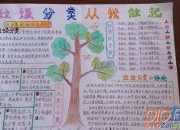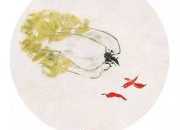初一优秀英语教学课件
时间:2021-08-31初一优秀英语教学课件
初一优秀英语教学课件1
一、教学目标:
1. 语言知识目标:
1) 能掌握以下单词:
guitar, sing, swim, dance, chess, play chess, draw, speak, speak English, join, club
能掌握以下句型:
① —Can you play the guitar? —Yes, I can./ No, I can't.
② —What can you do? —I can dance.
③ —What club do you want to join? —I want to join the chess club.
2) 能了解以下语法:情态动词can的用法
want to do sth.的用法
2. 情感态度价值观目标:
该部分内容贴近学生的生活,谈论的话题是能力。通过互相询问或谈论自己或对方在某一方面的能力,可以培养学生的一种群体意识。
二、教学重难点
1. 教学重点:
1) 学习询问和谈论彼此的能力和特长;
2) 掌握一些弹奏乐器的表达方式。
2. 教学难点:
情态动词can的构成和使用。
三、教学过程
Ⅰ. Lead in
1. 教师可携带一些易于演奏的乐器,也可带一些演奏乐器的图片,一边演示乐器,一
边说: I can play the guitar.…等;再指着图片说:He/She can play the violin.But I can’t play it.等;然后询问学生:Can you play the guitar?….并引导学生进行简单的回答。
2. Ss look at the picture in 1a. Then read the words and phrases. Let Ss match the activities
with the people.
Then Check the answers with the class together.
Ⅱ. Presentation
出示一些反映各种活动的图片、幻灯片或播放课件,引导学生谈论活动:
He/She can dance/swim/sing/"··But I can’t dance/swim/sing/...等,学习表达活动的动词短语。
Ⅲ. Game (What can I do?)
T: Tell your partners what you can do. For example:
I can play the guitar. I can sing and dance.
Ss work in groups. The let some Ss talk to their classmates in front of the class. Ⅳ. Listening
1. T: Now let’s listen to the tape, find out the right conversation, and number them 1-3. (播放lb部分的录音让学生听,引导学生根据所听到的内容,选出对话的顺序,完成1b部分的教学任务。)
2. Check the answers:(3, 2, 1 )
Ⅴ. Pair work
1. Ask the Ss to practice the conversations in 1b with a partner. Then make their own conversations.
(引导学生展开Pairwork活动,完成lc部分口语交际的教学任务,学会运用can询问和表达能力。)
Ⅵ. Listening
1. Work on 2a;
T: Now, look at the pictures on P2, listen to the four conversations. Just listen.
(Play the recording for the first time, students only listen carefully.)
Then, listen to the recording again, and circle the clubs you hear.
Check the answers with the class.
2. Work on 2b;
引导学生根据对话内容用正确的单词填空,补全对话,再播放听力材料一遍。让学
生进行校对,练习听力和写作能力,完成2b部分的教学任务。
Check the answers with the Ss.
Ⅶ. Pair work
1. Look at 2b and talk about what the people can do and the clubs they want to join.
老师可以和一名优秀的学生做一个对话的'例子,让学生们明白如何去问答,例如: T: What club does Lisa want to join?
S1: She wants to join the chess club.
T: Can she play chess?
S1: No, she can't.
2. Ss work in pairs to practice asking and answer about Lisa, Bob and Mary.
3. Ask some pairs to act out their conversations.
Ⅷ. Role-play
1. Ask Ss to look at the picture in 2d. Then Ss read the dialogue by themselves and try to
find out the answers to these questions.
① What club does Bob join?
② What club does Jane join?
Ss read the conversation by themselves and find the answers to the questions. Then check the answers:
① Bob joins the soccer club.② Jane joins the English and art club.
2. Explain something that Ss can't understand.
3. Let Ss read after the teacher or play the recording and let Ss read after the recording.
4. Ss work in pairs to act out the conversation.
5. Ask some pairs come to the front of the classroom. They try to act out the conversation. See which group is the best.
Homework:
1. Remember the new words and expressions after class.
2. Recite the conversation after class.
3. Write English names as many as possible in the exercises book.
初一优秀英语教学课件2
一、教学目标:
1. 语言知识目标:
1) 继续练习运用情态动词can。学会询问和谈论彼此的能力和特长。 能掌握以下句型:
① —Can you play the guitar? —Yes, I can./ No, I can't.
② —What can you do?—I can dance.
③ —What club do you want to join? —I want to join the chess club.
2. 情感态度价值观目标:
该部分学习询问或谈论自己或对方在某一方面的能力和特长,可以培养学生的一种群体意识,促进同学们对自身的认识,为将来的自我发展奠定基础。
二、教学重难点
1. 教学重点:
1) 让学生重点总结、发现情态动词can的用法。
2) 通过一些与学生们实际生活相贴近的教学活动,来达到熟练运用的目的。
2. 教学难点:
1) 情态动词can的用法;
2) 在实际交际活动中运用can来询问与表达自己或他人的能力。
三、教学过程
Ⅰ. Warming- up and revision
1. Ask some Ss about their abilities.
T: Hi, S1! What can you do?
S1: I can sing and dance?
T: Can you play the guitar?
S1: Sorry, I can't. But I can play chess.
T: What club do you want to join?
S1: I want to join the chess club.
2. Role-play.
Let some pairs role play the conversation in 2c.
Ⅱ. Grammar Focus.
1. 阅读指导:
2. 学生阅读Grammar Focus中的句子,然后做填空练习。
① 你会游泳吗?
______ you ______?
② 是的,我会。/ 不,我不会。
Yes, ____ _______. / No, I _______.
… (其余试题见课件部分)
3. 学生们完成填空试题后,可以打开课本检查答案,对错误的句子,单独进行强化记忆。 Ⅲ. Try to Find
老师将情态动词的can的用法,以学案的方式呈现在大屏幕上,让学生自主学习,并发现其用法。
1. 可以看出,在Can…?句型中,情态动词can没有________和_______ 的变化。
2. 用情态动词can来询问他人的能力可以归纳为以下句型:
Can + _______+ _________ + 其他?
肯定回答:_________________
否定回答: _________________
What + can + _______ + ________ ?
学生们合作学习讨论上面学案的答案,总结情态动词can的用法。
老师找部分学生对上述问题作答,并一起讨论总结情态动词can的用法。
Ⅳ. Practice
1. Look at 3a. 告诉学生们用所给的词汇来造句子。首先,用情态动词can及所给的第一个动词词组来造一个一般疑问句,并作出一个否定的回答。然后,用转折连词but及第二个词组造一个肯定句。
Teacher makes the first one as a model:
Can Wu Jun speak English? No, he can't, but he can speak Chinese.
Ss try to make sentences using the phrases in 2~5. They can discuss with their partners. Then let some Ss tell their answers to the class.
Check the answers with the class.
2. Look at 3b. Tell Ss that your school is going to have a School Show next week. What can you do? You can show your talent in it. In order to let all the students know about it. We have to write a poster. Now, read the poster below and try to complete the poster with the
words in the box.
方法指导:应通读全文,掌握短文大意;然后,仔细阅读每个句子,根据空格前后的词语进行推敲。比如,第三空格后有guitar一词,可知些空格应填play一词。其他类似。
学生们,按老师指导的方法进行阅读,并逐句推敲每空应填什么词,在实际的运用提高自己的阅读能力、分析能力及综合运用能力。
最后,教师与同学们一起校对答案,并对学生们有疑问的地方进行解释。
Ⅴ. Group work
1. What can your group do in the school show? Make a list, then report to your classmates.
2. First, work in group ask and answer about what you can do? e.g.
S1: What can you do, S2?
S2: I can do kong fu.
S1: Great! What about you S3?
S3: I can sing very well.
…
3. Then make a list together.
4. Everyone in your group must write a report. Then select one student to report what your group can do. e.g.
In my group, Li Ming can do kong fu. Zhang Li can sing very well. Ma Shuang can dance well…
(最后,可以经学生们评议来推举最有能力的小组)
Ⅵ. Exercises
1. If time is enough, do some more exercises on big screen.
Homework
1. Read the sentences in Grammar Focus.
2. Write a report about what your family members can do.











